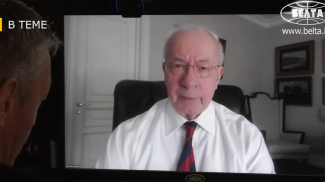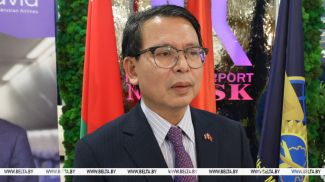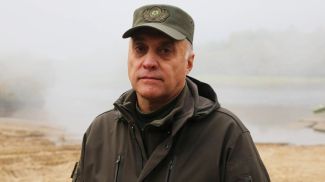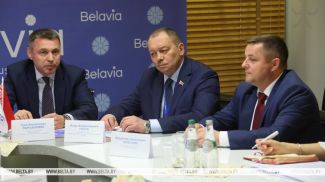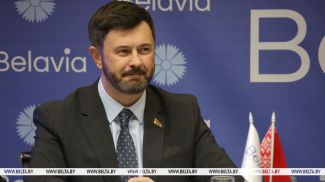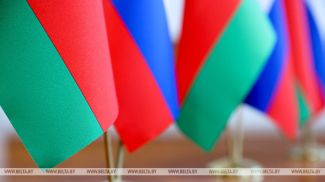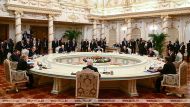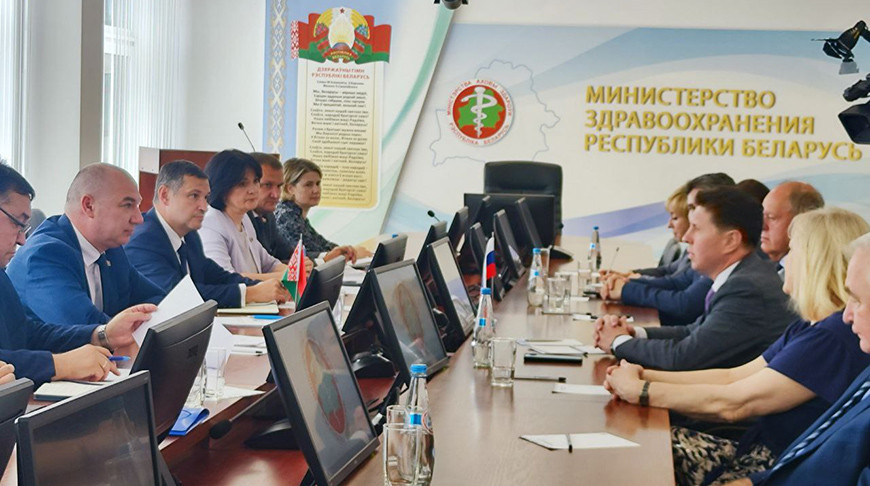
Photo courtesy of the Healthcare Ministry
MINSK, 16 July (BelTA) – Negotiations with healthcare officials and clinicians from St. Petersburg were held at the Healthcare Ministry of Belarus, BelTA learned from the press service of the Healthcare Ministry.
Welcoming the representatives of the Russian delegation, Belarus’ Healthcare Minister Aleksandr Khodzhayev noted that the parties have something to strive for and work on. Strong bilateral relations foster cooperation in education and healthcare, leading to improved access to quality services in the two countries. “At the same time, there are issues that probably require deeper interaction. For example, mutual recognition of certificates for drugs and medical devices,” the healthcare minister emphasized.
Leading experts in healthcare and pharmaceutics, heads of healthcare institutions voiced their proposals at the negotiations. The main topics were joint projects to upgrade healthcare systems, the exchange of best practices and introduction of innovative solutions.
According to Deputy Healthcare Minister Aleksandr Starovoitov, the delegation from St. Petersburg included experts from a wide range of medical fields.
The agenda for the discussion included many areas: from adolescent-friendly centers and reproductive medicine to cardiac surgery, transplantology and other areas that directly impact the life expectancy and quality of life of patients in Belarus and Russia.
Minsk and St. Petersburg develop cooperation in several areas. Firstly, this is medical work: patients have the opportunity to consult with specialists, and doctors themselves actively exchange experience and knowledge. Secondly, much attention is paid to academic collaborations - Belarusian and Russian specialists participate in postgraduate exchange programs, master new methods and technologies. The Belarusian pharmaceutical industry actively interacts with enterprises of St. Petersburg.
“We also discussed the possibility of exchanging postgraduate specialists with a view to sharing expertise and knowledge, mastering new methods and innovative approaches in order to implement them in practice,” the deputy minister noted.
During the negotiations, the topic of neonatology was also discussed. In particular, treatment of newborns with extremely low body weight. The Russian side presented a unique case of nursing a baby born weighing only 300g.
“In the last three years, we have been maintaining a broad and comprehensive collaboration across various healthcare sectors. We have brought leading doctors and experts from St. Petersburg to Belarus, including specialists in oncology, cardiac surgery (both pediatric and adult), cardiology. The chief specialist in adolescent reproductive health is also present. We are very interested in the Belarusian experience and best practices, which can become a valuable addition to the existing knowledge and technologies. It is safe to say that our doctors speak the same professional language. The practices, laid down in Soviet times, remain the basis for training specialists. Belarusian colleagues have not lost this experience and continue to build on it. This is especially noticeable in such areas as high-tech surgery and transplantology - areas that we are also actively pursuing,” said Alexey Tereshin, Deputy Chairman of the St. Petersburg Health Committee.
Welcoming the representatives of the Russian delegation, Belarus’ Healthcare Minister Aleksandr Khodzhayev noted that the parties have something to strive for and work on. Strong bilateral relations foster cooperation in education and healthcare, leading to improved access to quality services in the two countries. “At the same time, there are issues that probably require deeper interaction. For example, mutual recognition of certificates for drugs and medical devices,” the healthcare minister emphasized.
Leading experts in healthcare and pharmaceutics, heads of healthcare institutions voiced their proposals at the negotiations. The main topics were joint projects to upgrade healthcare systems, the exchange of best practices and introduction of innovative solutions.
According to Deputy Healthcare Minister Aleksandr Starovoitov, the delegation from St. Petersburg included experts from a wide range of medical fields.
The agenda for the discussion included many areas: from adolescent-friendly centers and reproductive medicine to cardiac surgery, transplantology and other areas that directly impact the life expectancy and quality of life of patients in Belarus and Russia.
Minsk and St. Petersburg develop cooperation in several areas. Firstly, this is medical work: patients have the opportunity to consult with specialists, and doctors themselves actively exchange experience and knowledge. Secondly, much attention is paid to academic collaborations - Belarusian and Russian specialists participate in postgraduate exchange programs, master new methods and technologies. The Belarusian pharmaceutical industry actively interacts with enterprises of St. Petersburg.
“We also discussed the possibility of exchanging postgraduate specialists with a view to sharing expertise and knowledge, mastering new methods and innovative approaches in order to implement them in practice,” the deputy minister noted.
During the negotiations, the topic of neonatology was also discussed. In particular, treatment of newborns with extremely low body weight. The Russian side presented a unique case of nursing a baby born weighing only 300g.
“In the last three years, we have been maintaining a broad and comprehensive collaboration across various healthcare sectors. We have brought leading doctors and experts from St. Petersburg to Belarus, including specialists in oncology, cardiac surgery (both pediatric and adult), cardiology. The chief specialist in adolescent reproductive health is also present. We are very interested in the Belarusian experience and best practices, which can become a valuable addition to the existing knowledge and technologies. It is safe to say that our doctors speak the same professional language. The practices, laid down in Soviet times, remain the basis for training specialists. Belarusian colleagues have not lost this experience and continue to build on it. This is especially noticeable in such areas as high-tech surgery and transplantology - areas that we are also actively pursuing,” said Alexey Tereshin, Deputy Chairman of the St. Petersburg Health Committee.




